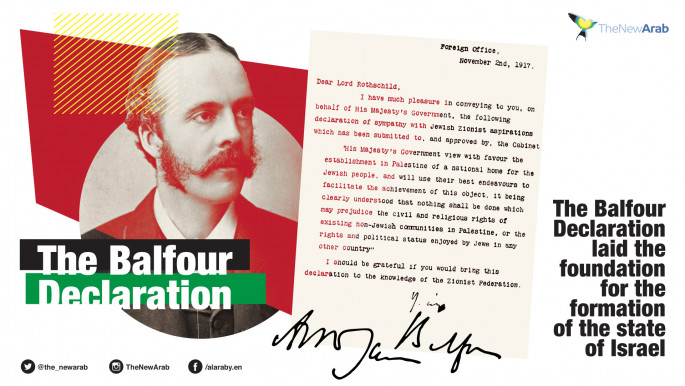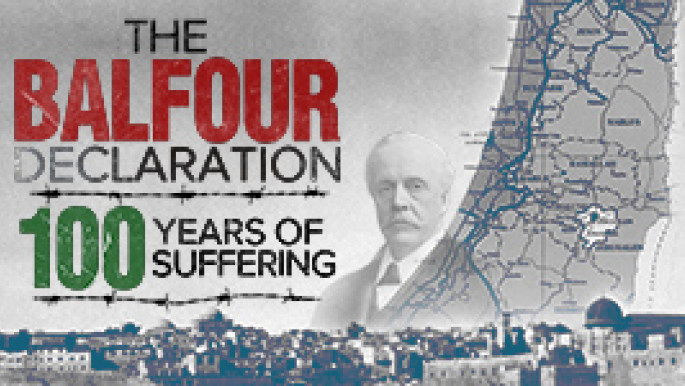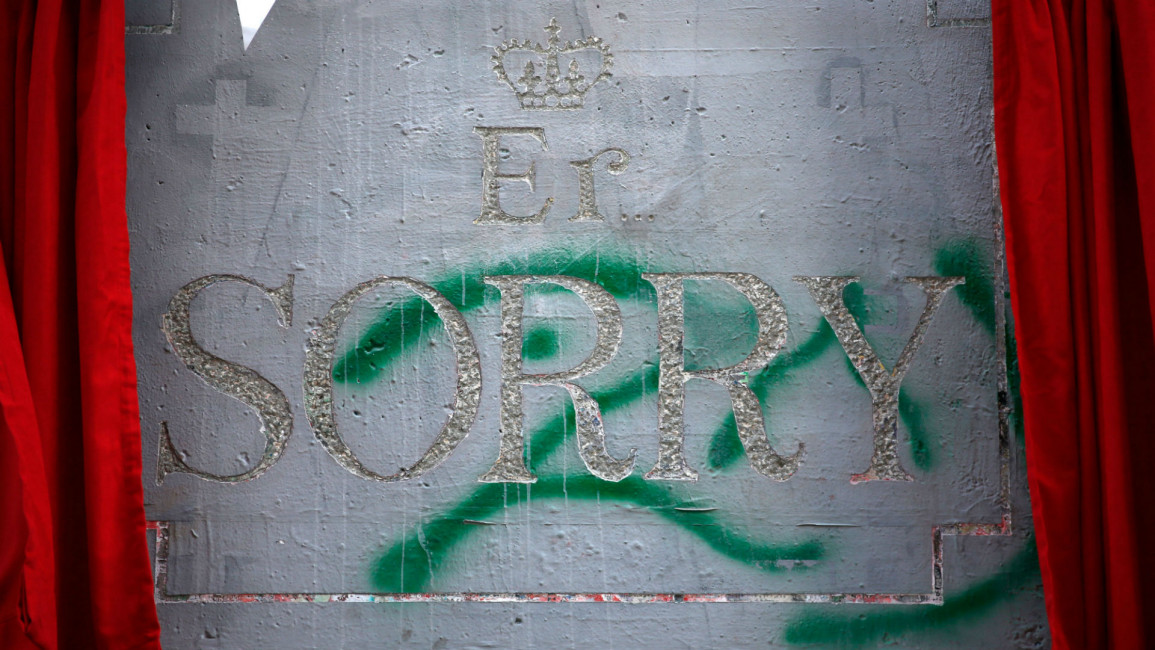
Britain in Palestine: From Balfour to Boycott
No stranger to controversy, she famously voted in favour of the Iraq war, before resigning from the front bench shortly afterwards, accusing former Prime Minister Tony Blair of deceit.
Short chaired a panel at a conference hosted by Middle East Monitor last month to mark the centenary of another controversial British foreign policy decision: the Balfour Declaration. In view of the disharmony sown by Arthur Balfour's letter in the Middle East, it is of no surprise that 100 years later it remains steeped in controversy.
Read more: What was the Balfour Declaration?
The infamous letter, sent to Lord Rothschild, announcing the government's support for the establishment of a "national home for the Jewish people" in Palestine, is 100 years old on November 2, but Short opened the session at the British Library by warning against being "mesmerised" by the wrongs of the past.
Joined by Irish journalist David Cronin, Jewish Moroccan novelist Dr Jacob Cohen, and editor-in-chief of the Palestine Strategic Report Dr Mohsen Saleh, Short said the history of the painful story was full of "double standards" and "injustice".
 |
In view of the disharmony sown by Arthur Balfour's letter in the Middle East, it is of no surprise that 100 years later it remains steeped in controversy |  |
"We need to learn from that, and how it happened, but our job is to stop the injustice going on now, and not argue about who was responsible before."
British collusion
Notwithstanding Short's opening remarks, Cronin delved back into history to give some context to the Balfour Declaration, which he said had "enabled the ethnic cleansing of Palestine".
The document was signed by the foreign secretary even though the British government knew the colonisation of Palestine posed an enormous threat to the land's indigenous people, he said. "The British government was not bothered by that threat, it regarded Palestinians as expendable."
Cronin - whose latest book, Balfour's Shadow: A Century of British Support for Zionism and Israel, describes how the immense impact of Balfour's letter still reverberates a century later - explained how Britain's early support for the Zionist movement soon had a discernible impact.
"The League of Nations mandate, under which Britain ruled Palestine between the two world wars, contained an explicit commitment to nurture Zionist colonisation," he said.
"The Balfour Declaration was, in effect, copied and pasted into that mandate."
Three years after Balfour's pledge, Herbert Samuel became the first British high commissioner for Palestine. He was a staunch Zionist and the appointment caused much trepidation among the native Palestinians.
"The Palestinians were right to be concerned," said Cronin. "Herbert Samuel introduced measures to allow acquisition by the Zionist movement of land on which Palestinians had lived and farmed for generations. Entire villages in the Galilee region were bought up by the Zionist colonisers, and when the people living in these villages refused to be moved, Herbert Samuel's administration overruled their objections."
 |
Britain laid the groundwork for the Nakba, the catastrophe that befell Palestinians in 1948. The British reneged on their legal and moral obligation to protect Palestinians from harm - David Cronin |
 |
Large scale evictions were sanctioned and the British administration and its allies in the Zionist movement encountered considerable resistance from the native Palestinians. By 1936 this resistance led to a major revolt and the British responded "with great brutality", said Cronin.
During this time British field marshal Bernard Montgomery instituted a "shoot to kill" policy. "According to Montgomery's order, anyone who assisted a rebel should be treated as a rebel," Cronin said. "Such broad guidance gave British soldiers carte blanche to terrorise Palestinians with impunity."
Britain also recruited members of the Hagana - the largest Zionist militia in Palestine - which later formed the core of the Israeli military. "That meant Britain trained many of the Zionist forces that would expel around 750,000 Palestinians from their homes the following decade," Cronin explained.
 |
|
"Through such collaboration, Britain laid the groundwork for the Nakba - the catastrophe that befell Palestinians in 1948," he said.
"The British reneged on their legal and moral obligation to protect Palestinians from harm."
Cronin described how Britain had "colluded" with Israel since the state was established. Harold Wilson's government provided hundreds of battle tanks to Israel in advance of the June 1967 war, he said, which means "the ongoing occupation of the West Bank - including East Jerusalem - Gaza, and the Golan Heights, was facilitated by cabinet members here in London".
"Britain is now a valued client of the Israeli weapons industry," he continued. The largest military drone project in Europe - known as "watchkeeper" - has been commissioned by the British army. It is manufactured by a consortium which includes Israeli company Elbit Systems "based on Israeli-designed killing machines that have been tested out against men, women and children in Gaza", Cronin said.
BDS: Lighting the way
In this centenary year it is time to combat the "Israeli propaganda" that is regularly advanced by representatives of both the Conservative Party and the Labour Party, Cronin said.
He relayed how, at the recent Tory party conference, environmental secretary Michael Gove called Israel "a truly miraculous nation, and a light unto the world".
"Michael Gove's choice of words was despicable," Cronin re-joined indignantly. "The state he described as a light unto the world has plunged Gaza into darkness by severely limiting the supply of electricity.
"The same light unto the world recently stole solar panels from a nursery school in the occupied West Bank," he continued. "That was a crime against children, it was a crime against the right to education, it was a crime against sustainable energy," Cronin said. "Yet for some reason it did not distress Britain's current environment secretary."
Responding to Short's opening soliloquy, Cronin looked to draw lessons from other oppressed communities, which may help end the injustices the Palestinian people continue to suffer today.
 |
|
| Special coverage of the Balfour centenary |
"When he headed the British administration in Ireland during the late 19th century, Balfour proposed that the boycotting of landlords should be punishable by up to six months of hard labour," he said. "Arthur Balfour had an aversion to boycotts.
"Interestingly, the origin of the term 'boycott' has been traced to Ireland in that period. The term got its name from Charles Boycott, a land agent based in County Mayo," explained Cronin.
After treating his tenants badly, and serving a series of eviction notices, the Mayo branch of the Irish Land League launched a campaign of isolation against Boycott, and his employees were urged to withdraw their labour.
"Boycotts can be a powerful tool to demand justice for an oppressed people," Cronin continued, "and it is only fitting that the Palestinians, the very people who Arthur Balfour regarded as expendable, are harnessing the power of boycotts in their struggle for justice and equality.
"The least the rest of us can do is to support that struggle by boycotting and isolating Israel. Let us take the light, my friends, in using a tactic that Arthur Balfour tried to ban," he concluded.
Recognition
Voicing his agreement, Dr Cohen said that the Boycott Divestment Sanctions (BDS) movement "has expanded its international influence by emphasising the ignorant racism of the Zionist ideology".
Cohen said that specific long-term campaigns should be maintained, with a chosen personality acting as a focal point. Perhaps drawing parallels with Nelson Mandela and his central role in bringing an end to apartheid in South Africa, he said Palestinian politician Khalida Jarrar should act as the campaign's figurehead.
Jarrar is one of the three deputies of the Popular Front for the Liberation of Palestine (PFLP), and has endured repeated administrative detentions at the hands of the Israeli forces.
"We should make her the popular human face of our campaign," he said, "which would be a way of combating the BDS bans that we are dealing with."
In 2015, in Cohen's home country of France, the highest court of criminal appeals upheld a decision to convict a dozen activists who had called for Israeli goods to be boycotted.
It is a worrying trend that has taken shape across the West. Most recently, following the havoc wreaked by Hurricane Harvey in Texas, it came to light that residents in a small suburb of Houston had to pledge not to boycott Israel in order to access relief funds. The condition has since been withdrawn.
"We should summarise this story - from Balfour to BDS - by a motto which renders all other goals irrelevant," Cohen concluded - "the delegitimation of Israel".
Cohen's transition from Zionist Youth movement member to anti-Zionist activist has garnered him few fans in France and Morocco, and though "the delegitimation of Israel" is certainly not a policy that any UK government woud pursue, there is evidence to suggest the wind is changing as to the long-neglected second half of Balfour’s declaration - "that nothing shall be done which may prejudice the civil and religious rights of existing non-Jewish communities in Palestine".
Theresa May is an outspoken admirer of Israel and has announced she will be marking the centenary of the Balfour Declaration with "with pride", but the Labour Party's rhetoric has notably shifted over the course of the past year.
During an interview earlier this week, shadow foreign secretary Emily Thornberry appealed for the British government to mark the occasion with a formal recognition of the state of Palestine. Such recognition would genuinely advance the two-state solution which has become ever more elusive over the past 20 years.
Thornberry, who will be attending a dinner with May and Israeli Prime Minister Binyamin Netanyahu on the centenary day, said that it would not be right to "celebrate" the Balfour Declaration. "I think we have to mark it because I think it was a turning point in the history of that area, and I think the most important way of marking it is to recognise Palestine," she said.
If Thornberry can stand by the courage of her convictions, the commemoratory event might cease to be the unadulterated celebration Theresa May had in mind.
Ben Clarke is a law graduate and independent correspondent. His work has featured in Middle East Eye, Mondoweiss and others.
Follow him on Twitter: @benclarke121
Opinions expressed in this article remain those of the author and do not necessarily represent those of The New Arab, its editorial board or staff.




